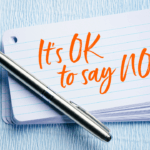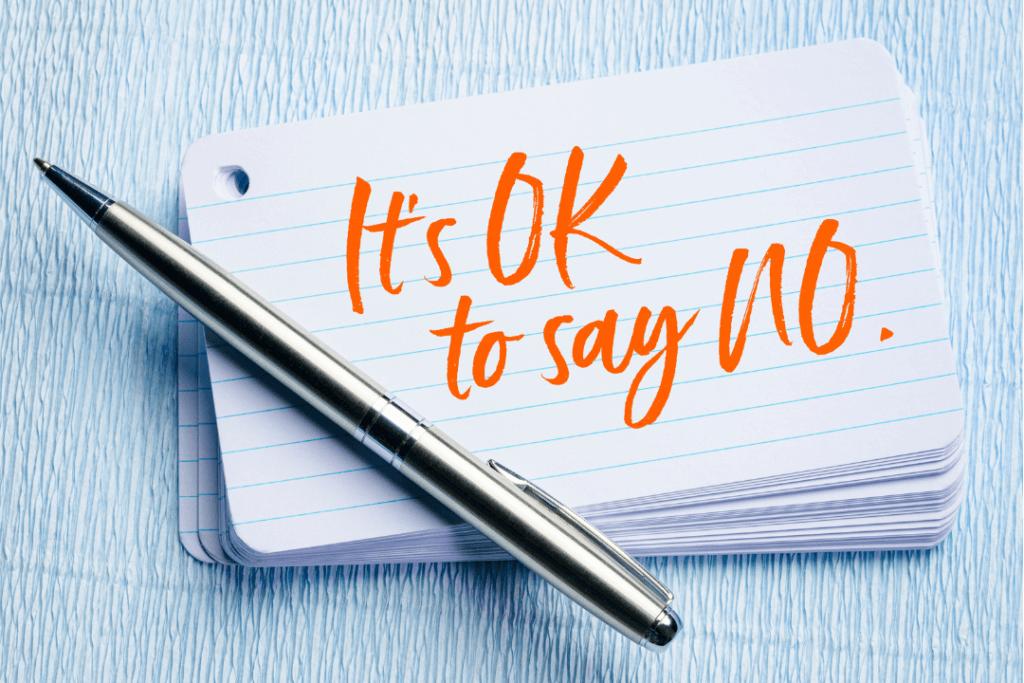The Power of "No"

On Thursday Afternoon, I received a call from a long-awaited client, asking me to plan a meeting on Saturday at 11 am. It was the client my team had been chasing for a long time for a discussion, but due to his travel schedule unable to fix a date. We were planning to meet him and discuss our proposal for his team and factory to establish Autonomous work culture and improve productivity.
The conversation goes like this
Client: “Hey Sagar, how are you? I appreciate your patience; due to my hectic travel schedule, I could not give you the time for discussion. I am back in India and will be happy to meet you Saturday at 11 am at my office.”
On other days, these words would make me happier, but they made me bit my lip that day. I was catching for this client for two months, waiting for this day. But at this time, I had planned a much-needed family trip to the South, and I had to board the flight the day after tomorrow, Saturday, at 10.30 am. I was in a fix while my client was waiting for my answer.
I quickly ran through all the possibilities in my mind and politely but firmly answered him.
Me: “I appreciate your appointment, but I’ve already committed to my family for a vacation, and I have a flight to catch the day after tomorrow at 10.30 am. If it wouldn’t be too much of a hassle, please reschedule this meeting for tomorrow, which is Friday instead of Saturday.
The older me might’ve cancelled the trip or delayed my travel plan and let the family carry on, but the newer me dealt with this situation differently.
The Integrated Life needs you to align the elements to achieve a sense of fulfilment; one of them is your focused goals.
I was ready to face the consequences. Would you believe what happened?
The client answered, ‘I appreciate your honesty and prior commitment to your family. I understand keeping up the promises as well. Let me check my schedule tomorrow and get back to you. He called back after an hour and rescheduled it a day earlier. I was elated.
Do you also face such situations?
What’d you do if you were in my place?
Would you also deal with this problem in the same way?
I was not the same earlier. For the past few years, I have experienced these elements to live The Integrated Life, which has helped me to understand my priorities. That allows me to take ownership of my decisions or choices and live a life without any regrets or guilt.
During my earlier days when I was working in a corporate and later in a manufacturing firm, by nature, I was so submissive that I used to say Yes to everything that came my way.
Why? Even I reflect sometimes
We often deliver answers in this automatic response as our brains are wired in that way or muscle memory.
Some examples stating the above point are:
A student agrees to give notes to his friend, who doesn’t return them until the exam day. It hinders his study for that test and affects his score.
A corporate employee dug deep into work and said yes to his boss for delivering a project at a close deadline but couldn’t complete it. He ruins his impression and paves the way for questioning his further work commitments.
A housewife says yes to in-laws even when she runs out of time for her schedule. She completes the work but gets late for further proceedings. In the process, she makes way for resentment from family members, compromising health and resulting in a dual loss at both ends.
What did they gain by saying yes when they should’ve said No?
Loss of more important things like health, reputation or losing the otherwise favoured result, and trust from the people they said Yes.
They tried to be nice to them by not upsetting them by saying – Yes, but it turned the other way round. These situations prove the fact that we are people pleasers.
My younger son is just five years old, and when asked by an elder if he would like to go with him to a movie, he refused with a cute face and said I wish to play with my friends right now. It was so simple, yet it taught me how important it is to say NO.
You wouldn’t think much before saying a No when you were a child. Children do things according to their moods. But as they grow up, they learn the consequences of saying No. They may hamper their responses since they find out – it is not a good practice to disobey parents as they might be punished or displease them.
From that time onwards, you develop a mindset of prioritising others over yourself and an inability to say No.
You feel saying Yes is more manageable than no at any given time. It is way more accessible as we humans get manipulated in so many ways by our surroundings.
What are the factors that make us say yes?
You tend to agree to people or circumstances in given conditions:
- Wish to remain in good books: You are a people pleaser and prefer self-neglect rather than displeasing others.
- Confidence in handling multiple things: You are confident you can juggle numerous things at a time, and you do not mind being overburdened or taking additional stress in showing your ability to handle multiple subjects.
- Avoiding a guilt trip: You feel bad over refusing someone a favour and try to avoid that guilt trip at the cost of your happiness.
- Weighing people’s priorities over self: You are a very considerate and understanding person toward others and cannot refuse anyone.
- Giving in to persuasive people: You tend to give in to people who are more influential and convince you into something they desire.
- Saying a temporary yes to get out of it later: You evade conflicts and agree at that moment, thinking to dodge off later.
- Feel it’d disrespect the person: You grade that person too much and think denial would be disrespectful.
- Worry about missing better opportunities: You tend to imply that refusing something to do at present would shut down your path for better opportunities in the future.
Saying yes is more straightforward but does unpredictable harm to your productivity levels. It disturbs the elements of your life, giving you the feeling of regret.
It takes courage, practice, patience and perseverance to cultivate the art of saying No. The importance of saying No is precisely what renowned leaders try to explain in their quotes.
Warren Buffet says – Successful people say no more than they say yes.
Whereas Paulo Coelho says – When you say Yes to others, make sure you are not saying no to yourself.
Both stress your well-being and advancement in your paths by learning the art of saying No and opening doors to your future progress.
I was once stuck between choosing my speaking engagement offer on the same date clashing with my son’s stage show in the school I promised him to attend long ago.
It was a tough decision, and it took a lot of effort to talk to the client, offer them an alternative date, and recommend a fellow speaker just in case they cannot reschedule.
To my surprise, they chose the recommended fellow speaker and signed me up for the next event in advance for the subsequent convection at their organisation. I attended my son’s stage show as promised, keeping my professional commitment and client happy.
Isn’t our family a priority? We live We Earn to give them comfort to make their lives better.
What’d you’ve done if you were in my place? Wouldn’t you, too, make efforts to create an Integrated Life, rescheduling things or refusing work at a prior commitment already made with family?
I’m sure you, too, would reap the benefits a simple no can bring about.
Saying NO in the right way is an exciting thing:
- It can reduce stress: You tend to be more stress-free when you say no to unwanted or excess things or people. You are not easily overwhelmed by people or situations, whether professional, social or personal. It paves the way for your mental well-being.
- It can define boundaries: When you say- No, you decide on your deliverables. People become aware of what they can accept of you, and gradually with such a defined set of boundaries, people will stop asking you beyond that.
- It reduces bitterness: When you say yes to people you wanted to say no to, you end up hating that person. You are more resentful towards that person in further meetings as you forcibly had to agree then. Saying no reduces this bitterness when you never have to face this situation.
- You become less remorseful: You never regret anything when you say No because you are left with choices of things you want to do. You are never resentful toward anything when you learn the art of saying No.
- You hold the reigns of your life: You can easily focus on the essential things when you say no to unimportant things. That way, you learn to prioritise what’s vital for you and what’s not. You tend to balance out something you feel is essential. Some include acquiring new skills for your career, spending time with family or self-care for healthy well-being.
When there are so many benefits to saying no, why should you fall into the trap of saying yes?
Why not learn the tactics to say no and smoothen life instead of complicating it?
At this point, you are bound to worry about the outcome if you say no, especially if you are new to a place.
You’d be concerned about making a wrong impression with your no. I understand your distress, and in the video below, I’ve shared an example of a situation between a newly hired employee and his boss.
With the help of this video, you’ll get an idea of how to say no subtly and turn the ball in your court.
Sagar Amlani in conversation with Shantanu at ICFAI
Saying no doesn’t mean you show arrogance or attitude and make it sound not polite.
Your behaviour should not indicate that you are taking pride in saying NO, but you won’t be able to do it then. Saying NO should not become your habit to avoid taking responsibility. It’s a costly attitude that you should use only when there is a genuine need to focus on your goals and priorities in life.
You needn’t be sorry as you are not doing something wrong, choosing yourself over others. But it should be subtle, reasonable, logical, and polite but firm NO.
In the book The Key, I have given some actionable tips for learning the art of saying NO.
The Results are phenomenal, as they will help you develop a Productive Mindset to lead an Integrated Life full of a sense of fulfilment, happiness and gratitude.
Do share your experiences with me at sagar@sagaramlani.com
This listicle shows how saying No makes you more productive.
By saying no, you are-
- More confident in your deliverables, and people respect you: When you say no to other things, you focus wholeheartedly on what you are working on and deliver it with optimum results. The results are always fantastic, and you gain respect for your work in the long run. When you commit to something you wish to, you have results more than expected as you become more productive.
- More light-headed: You stop taking things personally. This you acquire over time as you constantly remind yourself of the priorities you set and their importance. Gradually, people’s opinions of you won’t stir you as their thoughts or sayings won’t move you. You know your priorities and self-worth and have a vision of your life. When you value yourself, you believe in your abilities and your productivity increases. Every other thing becomes futile in front of these priorities for you.
Conclusion:
By saying Yes, you fall into the trap of self-destruction, hindering your mindset and impacting your abilities. By cultivating a habit of Saying No, you focus on the crucial things that require your time and attention, and you scale in every aspect. Make sure your No doesn’t sound rude but is logical and direct.
The sure-shot way to develop a Productive mindset is learning the art of saying No. This art leads you on a path to an integrated life.
To learn in-depth about the productivity mindset and the subtle art of saying No, refer to the book The Key.




Loved the way you depicted your own life live examples.💛